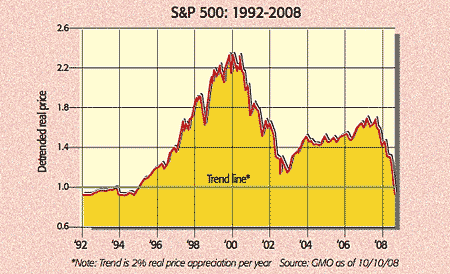How to avoid being ripped off by the financial industry
The financial sector is full of people offering to help you grow your money. But their fees and commissions can take a big chunk out of your returns. John Stepek looks at how to avoid being ripped off.

Get the latest financial news, insights and expert analysis from our award-winning MoneyWeek team, to help you understand what really matters when it comes to your finances.
You are now subscribed
Your newsletter sign-up was successful
Want to add more newsletters?

Twice daily
MoneyWeek
Get the latest financial news, insights and expert analysis from our award-winning MoneyWeek team, to help you understand what really matters when it comes to your finances.

Four times a week
Look After My Bills
Sign up to our free money-saving newsletter, filled with the latest news and expert advice to help you find the best tips and deals for managing your bills. Start saving today!
Britain's eight million investors are losing an average of £800 a year to hidden charges in funds, reckons The Telegraph.
We can't say we're all that surprised.
The financial industry is awash with people offering to help you to grow your money. More often, what they're really interested in is growing their own nest eggs through a combination of fees and commission.
MoneyWeek
Subscribe to MoneyWeek today and get your first six magazine issues absolutely FREE

Sign up to Money Morning
Don't miss the latest investment and personal finances news, market analysis, plus money-saving tips with our free twice-daily newsletter
Don't miss the latest investment and personal finances news, market analysis, plus money-saving tips with our free twice-daily newsletter
Alan Miller of SCM Private puts it well when he tells The Telegraph: "It is riddled with blatant self-interest and conflicts of interest that would never be tolerated elsewhere." Investors have "become victims" amid rising charges and "below-par returns".
You might be tempted to throw up your hands and give up investing altogether. But you'll find it hard to grow a decent retirement pot on the rates being offered by banks just now.
So what can you do to avoid being ripped off?
Fund managers have ants in their pants
There are lots of reasons why the financial industry ends up taking more money off you than you might expect. But one key problem is that professional fund managers seem to have ants in their pants.
Whatever you think of Warren Buffett's folksy style, he's a very impressive investor. And his oft-quoted advice about imagining that you can only buy 20 stocks in your lifetime is a good way to look at investing. It certainly makes you think before you buy.
Fund managers love to quote Buffett, but they don't seem to pay attention to him. In the year to March 2009 for example, average turnover among unit trusts hit 90%. In other words, almost the entire portfolio (and we're talking many more than 20 stocks per fund here) was bought and sold during the course of the year.
Massive volatility was one reason for the huge turnover. Fund managers need to keep up with their peers US fund manager Jeremy Grantham calls this "career risk". That basically means trying to track the market and not get left too far behind, in case you get picked off.
It's a classic example of what's best for the fund management firm being directly opposite to what's best for their clients. An interesting study (Economists' Hubris by Shahin Shojai of Capco, George Feiger of Contango Capital Advisors and Rajesh Kumar of the Institute of Management Technology) mentioned in The Economist's Buttonwood column this week, elaborates on the problem.
Is your fund manager performing?
What investors in an actively managed fund really want to know or should really want to know is an answer to this simple question: "How much of a return is the manager adding, over and above what I'd have got from the market anyway"? Or to put it more bluntly: "What am I paying this guy for? And is he worth it?"
There are plenty of ways to measure this, but most of them aren't very transparent to your average retail investor.
The writers suggest a very simple alternative measure, whichButtonwood dubs "the inertia benchmark". The idea is that clients should be able to compare the performance of the portfolio over the past year, "with the return that would have been achieved had the fund manager done nothing at all."
Why is this clever? Two reasons.
First, it makes it very clear whether or not the manager is adding value. None of this gibbering on about alpha and Sharpe ratios. This shows you very clearly did the fund manager's actions make the portfolio's performance better or worse over the given time frame?

- Why UK property prices are going to fall 50%
- When it will be time to get back in and buy up half price property
Secondly, and perhaps more importantly, if a manager knows he'll be benchmarked against his initial stock selections rather than an index, then he'll think much more carefully before making changes in a desperate attempt to track the market. After all, if you are simply benchmarked to your initial stock selections, then the safest way to get an average result is to simply do nothing. That "discourages the excessive trading or churning of portfolios".
Less buying and selling means fewer trading costs to bite into your returns. But it also seems to deliver better underlying returns in any case.
The researchers tested their theories, asking 12 groups of students to pick 23 stocks from various markets. They were allowed to make changes to their portfolios over a three-year period. But at the end of the three years, they found that if the students had simply left their portfolios unchanged over the period, then they would have performed better in two out of three cases.
There's plenty to be learned here for the retail investor. Don't allow short-term noise to panic you into changing your long-term investment stance. If you thought it through properly, then your original reason for buying an asset was probably sound. So if it hasn't changed, then don't sell out.
But probably the most important point is this: the fund management industry is simply not very well aligned to your interests. What you care about is the actual amount of money that you get at the end of your investment period, be that five, ten or 20 years. What your average manager cares about is next quarter's results.
How you can avoid being ripped off
What can you do about it? Well, you can invest for yourself of course. But assuming you don't want to pick your own portfolio, then the main message is to keep your costs low.
That means that where possible, you should try to avoid investing via unit trusts. If you really want an active manager, then investment trusts are a better bet. They are a bit unfashionable, but we've always been fans. As broker Charles Stanley puts it: "investment trusts generally provide investors with better performance, higher dividend yields and crucially, lower fees, than their open-ended equivalents."
And because they trade on the stock market just like any normal share, they sometimes trade at a 'discount', in other words, below the value of their underlying assets.
But better yet, you can cut out the fund manager entirely, and go for passive management through tracker funds or exchange-traded funds (ETFs). ETFs have their issues (you can read more about recent concerns over their tax treatment here: Beware the ETF tax trap, and also more on the sector in general here: All you need to know about exchange-traded funds). But they are a great way to get cheap and transparent access to a wide range of markets, as long as you understand what you're buying. ETF specialist Paul Amery has more on ETF charges compared to unit trusts in the next issue of MoneyWeek (out on Friday). If you're not already a subscriber, subscribe to MoneyWeek magazine.
Our recommended article for today
The news on BP is getting better so should you buy in?
It looks as though the worst is over for BP. The Gulf of Mexico leak is nearly plugged, and it has a new, media-friendly chief executive. But does that make it a good investment? John Stepek gives his view.
Get the latest financial news, insights and expert analysis from our award-winning MoneyWeek team, to help you understand what really matters when it comes to your finances.

-
 Early signs of the AI apocalypse?
Early signs of the AI apocalypse?Uncertainty is rife as investors question what the impact of AI will be.
-
 Reach for the stars to boost Britain's space industry
Reach for the stars to boost Britain's space industryopinion We can’t afford to neglect Britain's space industry. Unfortunately, the government is taking completely the wrong approach, says Matthew Lynn
-
 Five top investment trusts to buy and forget until 2040
Five top investment trusts to buy and forget until 2040Tips Picking winning long-term stocks is extremely difficult but, with a sensible spread of solid funds, investors can look forward to maximum gains with minimum fuss, says Max King
-
 How to find a contrarian fund manager
How to find a contrarian fund managerTutorials Contrarian investing – profiting from out-of-favour assets – isn’t easy. In an extract from his book, The Sceptical Investor, John Stepek looks at how to find fund managers who can do it.
-
 Perma-bears turn bullish
Perma-bears turn bullishFeatures This month Jeremy Grantham became one of many respected value investors, including Warren Buffett and Anthony Bolton, to declare that stocks look cheap. So is it time to pile back into the markets?